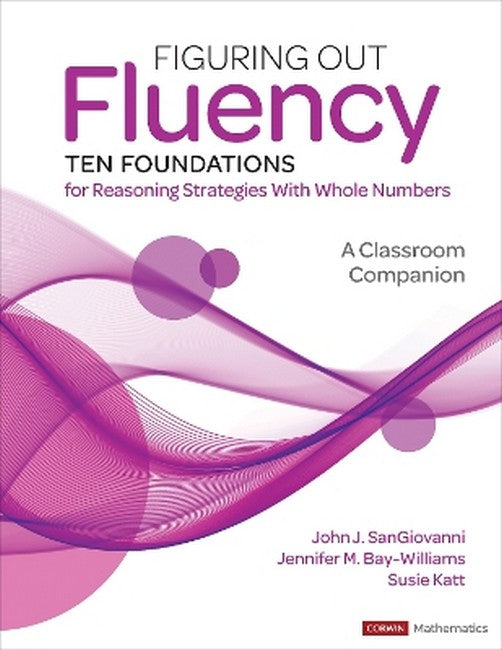Part I: Figuring out Fluency Foundations: Big Ideas Part 2: Foundations Modules Module 1: Number Relationships: Comparison and Estimation Module 2: Subitizing to Decomposing Module 3: Distance to 10, 100, and 1,000 Module 4: Counting and Skip-Counting Module 5: Properties of Addition and Its Inverse Relationship with Subtraction Module 6: Properties of Multiplication and the Inverse Relationship with Division Module 7: Multiplying by 10s and 100s Module 8: Multiples and Factors Module 9: Doubling and Halving Module 10: Computational Estimation Part 3: Taking Action Appendix A: Activity List References
Request Academic Copy
Please copy the ISBN for submitting review copy form
Description
This most recent addition to the Figuring Out Fluency series is outstanding! It provides guidance and support for building foundational fluency skills and practical ways to implement meaningful assessment and joyful practice. This book could shift mindsets about what it truly means to be fluent in math. -- Deborah Peart * Ocala, FL * SanGiovanni, Bay-Williams, and Katt have done it-the ultimate fluency resource! The focus is on helping students through their struggles using the lens of the foundational knowledge and skills needed for computational fluency. This is a perfect blend of lesson seeds, routines, games, and centers that provide first instruction or intervention for every student. This book, coupled with self-reflection, humility, and productive struggle, provides a rock-solid foundation so all students can weather any storm! -- Ron Perry * Williamsville, NY * Figuring Out Fluency-Ten Foundations for Reasoning Strategies With Whole Numbers is a game changer! In this companion to the Figuring Out Fluency series, the authors provide teachers with hands-on, engaging resources to support teaching and learning of foundational fluency concepts. This resource uses games, routines, and centers to help focus on reasoning about fluency concepts! -- Latrenda Knighten * Baton Rouge, LA * Undoubtedly the most impactful book in the series, Figuring Out Fluency-Ten Foundations for Reasoning Strategies With Whole Numbers is a must-have for every elementary teacher. It explains not only the foundational skills and concepts needed for fluency but also the how and why they are necessary for strategic thinking. The look-fors and practical, easy-to-implement ideas for instruction and practice will help students build their mathematical identities and grow as mathematical thinkers. -- Brenda Dzwil & Holley Duffy * Newington, CT * Get ready for a comprehensive yet accessible read for teachers to lay the roadmap for equipping students with indispensable foundational skills for learning fluency strategies. The authors outline ten foundations and supplement them with descriptions, examples, and teacher-friendly language to implement in the classroom tomorrow. The variety of included activities will create a book filled with dog-eared pages that teachers will reach for regularly. -- Marci Ostmeyer * Columbus, NE * The ten foundations for reasoning strategies shared in this book are practical and designed for immediate classroom application. They encompass methods to teach, practice, and assess fluency, which foster a supportive learning environment that cultivates a positive math identity among students. -- Janel Marr * Kaneohe, HI * This book provides teachers with an understanding of how to support and solidify foundational skills for students. It gives teachers a toolkit of assessments, games, and centers that are easily accessible and effortless to implement. It also challenges the traditional classroom, pushing the teacher to become more of the facilitator while encouraging an equitable education for all students. -- Marissa Giangrosso * Blue Springs, MO * I own every book in the Figuring Out Fluency series, and this is the missing piece. This book examines the why and how number sense works in building procedural fluency with tools both for student practice and assessment of understanding. The structures and strategies are explained in a way that new and veteran teachers can implement in the classroom. -- Christina Worley * Port Saint Lucie, FL *

